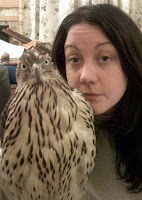I read this book with very low expectations. I enjoyed
Sister by Lupton, which was why I bought this book and
Quality of Silence. Both
Sister and
Quality of Silence don't have conclusive endings, and I was convinced that Lupton would do the same thing again. As a result, I had been putting off reading this. Also, from what I had seen on Goodreads, it seemed most people did not enjoy this at all. Yip, my expectations were really low.

So what is
Afterwards about? Grace runs into the burning school to save her daughter Jenny. But that is only the beginning. Things are going to get more dangerous, and how can Grace stop it when she is in a coma in the hospital?
While my synopsis is better than the one on the back of the book, it does not quite do the story justice.
Afterwards is written similarly to
The Lovely Bones or
Black Dog Summer, where the narrator is not quite there - at least not physically. I thought it worked really well in this story. When Grace and Jenny were wandering around the hospital, following loved ones, in their ghostly forms (not a spoiler - that happens around chapter 2), I appreciated how Lupton captures a healthy and realistic relationship between mother and daughter. No, it is not perfect. But what mother daughter relationship is? In fact, while this book does keep one on their toes, it is more a family drama than a psychological/crime thriller. I think this is the point to keep in mind when the ending, again inconclusive, arrives.
“It's not the fledgling birds that are thrown out of the nest by their parents and made to fly; it's the parents who are made to get the hell out of cozy family nest by their teenage offspring. It's we who are made to be independent of them, crash-landing if we don't manage it.”
― Rosamund Lupton, Afterwards
Continuing on with the characters, I also appreciated how Lupton depicted the husband and young son. So often in books, these types of characters are honey-ified to the point that I just get irritated. It is trying to get my sympathy for the poor perfect husband who has got to go through an ordeal; or to make me feel devastated for this poor sweet child.... Meh. No one is perfect, and that type of character just screams 'false' to me. Lupton does NOT do this. YAY! Her characters came across as realistic, with their bumps and stubble. I think their lack of perfection made me like them more. It also made me want them to get a positive conclusion.
Rosamund Lupton does what I which crime writers would do (besides write very well); she creates webs of intrigue. Characters say one thing and yet their actions do not quite match, different stories are told and no one is being completely honest. The story is a bit of a roller coaster ride; there are places even where the plot flips completely over and the reader is no longer sure which way the story is going because it is no longer heading where one thought it was. And then there are the twists and turns. It was a ride, especially as I am a reader who likes to solve the crime before the cops do.
I gave this 4 stars. I really enjoyed it. Lupton is a 5 star author, if only she would give me a damned ending - you know, a proper, solid, no more questions, ending. (Ok, so this one did feel more conclusive in some ways, but there are SO many things I want to know still.)
 North is a circus girl, who lives on a circus boat, and who performs with a bear. She is required to marry a young man she doesn't even like. Callanish is a girl with secrets who is left repenting for something as a Gracekeeper, a water-world version of an undertaker. She was originally from the land. This book covers their lives.
North is a circus girl, who lives on a circus boat, and who performs with a bear. She is required to marry a young man she doesn't even like. Callanish is a girl with secrets who is left repenting for something as a Gracekeeper, a water-world version of an undertaker. She was originally from the land. This book covers their lives.








